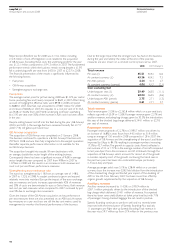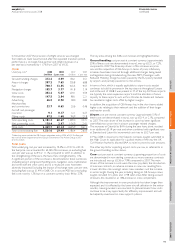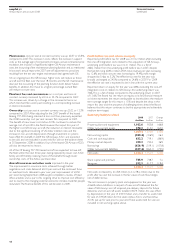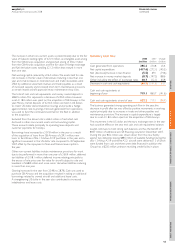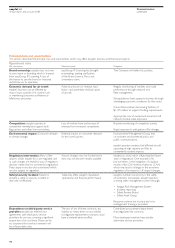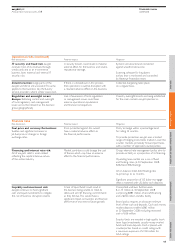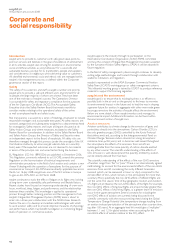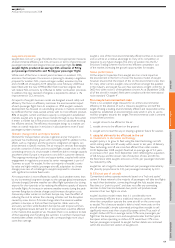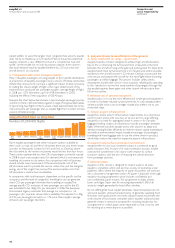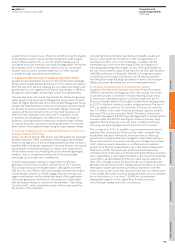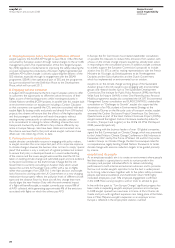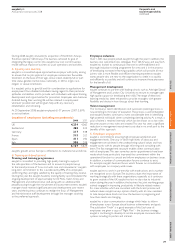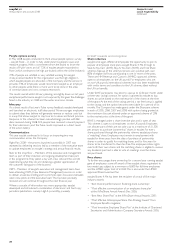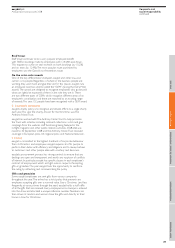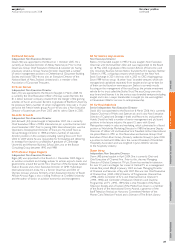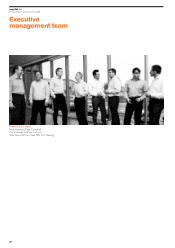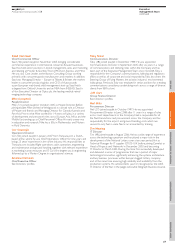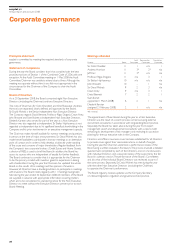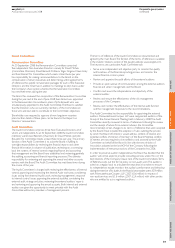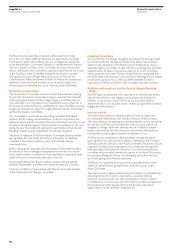EasyJet 2008 Annual Report Download - page 22
Download and view the complete annual report
Please find page 22 of the 2008 EasyJet annual report below. You can navigate through the pages in the report by either clicking on the pages listed below, or by using the keyword search tool below to find specific information within the annual report.
20
easyJet plc
Annual report and accounts 2008
Corporate and
social responsibility
continued
In Europe, the EU Commission has initiated stakeholder consultation
on possible EU measures to reduce NOxemissions from aviation, with
a focus on the climate change impacts; easyJet has already been active
in responding to the consultation process. In addition, easyJet continues
to actively support the European Commission’s proposals to include
aviation into EU ETS as well as making representations with the French
Ministère de l'Ecologie, du Développement et de l'Aménagement
Durables and the Swiss Authorities and the Dutch Government,
which has implemented an environmental tax on aviation.
easyJet sits on the climate change working group of the Sustainable
Aviation group in the UK. easyJet is also engaging with environmental
groups and research bodies such as The Sustainable Development
Commission, The Institute for Public Policy Research (IPPR), the World
Wide Fund for Nature (WWF) in their One Planet Business Personal
Mobility programme. easyJet also completed the UK DfT Environmental
Management Survey consultation and EUROCONTROL’s stakeholder
consultation on “Challenges to Growth”. easyJet also supported the
dissertation of an MSc student in Environmental Strategy at the
University of Surrey on the life-cycle costs of transport modes. easyJet
answered the Carbon Disclosure Project Greenhouse Gas Emissions
Questionnaire as part of the latest Carbon Disclosure Project (CDP6).
easyJet received the highest Carbon Disclosure Leadership Index for
its sector (Transport and Logistics) in the CDP6 UK FTSE 350 Report
2008 (www.cdproject.net).
easyJet, along with the business leaders of over 150 global companies,
signed the Bali Communiqué on Climate Change, which was presented
to the United Nations Climate Change Conference in Bali, Indonesia in
December 2007. Led by The Prince of Wales’s UK and EU Corporate
Leaders Groups on Climate Change, the Bali Communiqué called for
a comprehensive, legally binding United Nations framework to tackle
climate change with emission reduction targets to be guided primarily
by science.
easyJet and its people
As an employer, easyJet’s aim is to create an environment where people
feel that easyJet is a great place to work; to nurture pride in the
Company and people’s individual efforts; to deliver outstanding
performance to both internal and external customers and to promote
the low cost model. easyJet’s aspiration to be the best is underpinned
by its strong cultural values together with its five pillars: safety, customers,
people, operational excellence and shareholder return. With highly
motivated employees (over 70% employee engagement confirmed
in the 2008 Pulse survey) easyJet is well on track to achieve its goal.
In line with the quest to “Turn Europe Orange” significant progress has
been made in expanding easyJet’s employer presence across Europe.
In 2008 easyJet opened two new bases in France, at Paris Charles de
Gaulle and Lyon, with significant expansion also taking place at the Italian
base in Milan Malpensa. easyJet’s expansion as an employer across
Europe is reflected in the employment statistics overleaf.
C. Shaping European policy on making ATM more efficient
easyJet supports the ACARE ATM target to save 5% to 10% of the fuel
consumed by European aviation through radical changes to the air traffic
management system. The implementation of the EU’s Single European
Sky (SES) legislation is fundamental to improving the safety, reducing the
cost and increasing the productivity of Europe's highly fragmented and
inefficient ATM system. easyJet is actively supporting the delivery of the
SES initiatives, especially through its engagement with the SESAR
programme. SESAR is the operational part of SES and the programme
has just transitioned from the Definition Phase to the Development
Phase, which will run until 2013.
D. Engaging with the consumer
In August 2007 easyJet became the first major European airline to offer
its customers the opportunity to offset the carbon emissions of their
flights as part of the booking process whilst investing exclusively in
United Nations-certified JI/CDM projects. In parallel with this, easyJet built
an environment section on easyjet.com including a Carbon Calculator
so that consumers can quantify the CO2emissions associated with each
easyJet flight. By buying credits exclusively and directly from UN-backed
projects, the scheme will ensure that the offset is of the highest quality
and that passengers’ contribution will reach the projects without
wasting money unnecessarily on administration. easyJet continues
in its commitment to making its carbon offsetting scheme the most
transparent, trustworthy and efficient of any scheme offered by any
airline in Europe. Take-up rates have been stable and consistent since
the scheme was launched to the point where easyJet customers have
offset over 100 million Kg of CO2to date.
E. Participation with stakeholders
easyJet devotes considerable resource in engaging with policy makers,
as easyJet considers this as an important part of its corporate response
to climate change. However, the business does not aim to simply “special
plead” that aviation is only a small part of a global problem, but instead
to ensure that policy is developed based on a sound understanding
of the science and the issues. easyJet welcomed the lead the UK has
taken on tackling climate change and submitted paper and oral evidence
to the Joint Committee on the draft Climate Change Bill. The UK
Government is currently consulting on Aviation Duty, which would
replace the current Air Passenger Duty (APD) with a tax on flights
rather than passengers from 2009. This is the right decision and easyJet
looks forward to working with the UK Government on a new charging
mechanism that properly reflects the pollution levels of different aircraft
types and the distance flown by those aircraft. Any change that more
closely aligns the new Aviation Duty with the environmental impact
of a flight will benefit easyJet, as easyJet currently pays around 8% of
all APD collected, while generating approximately 4% of the emissions
associated with flights on which the airlines pay APD.


